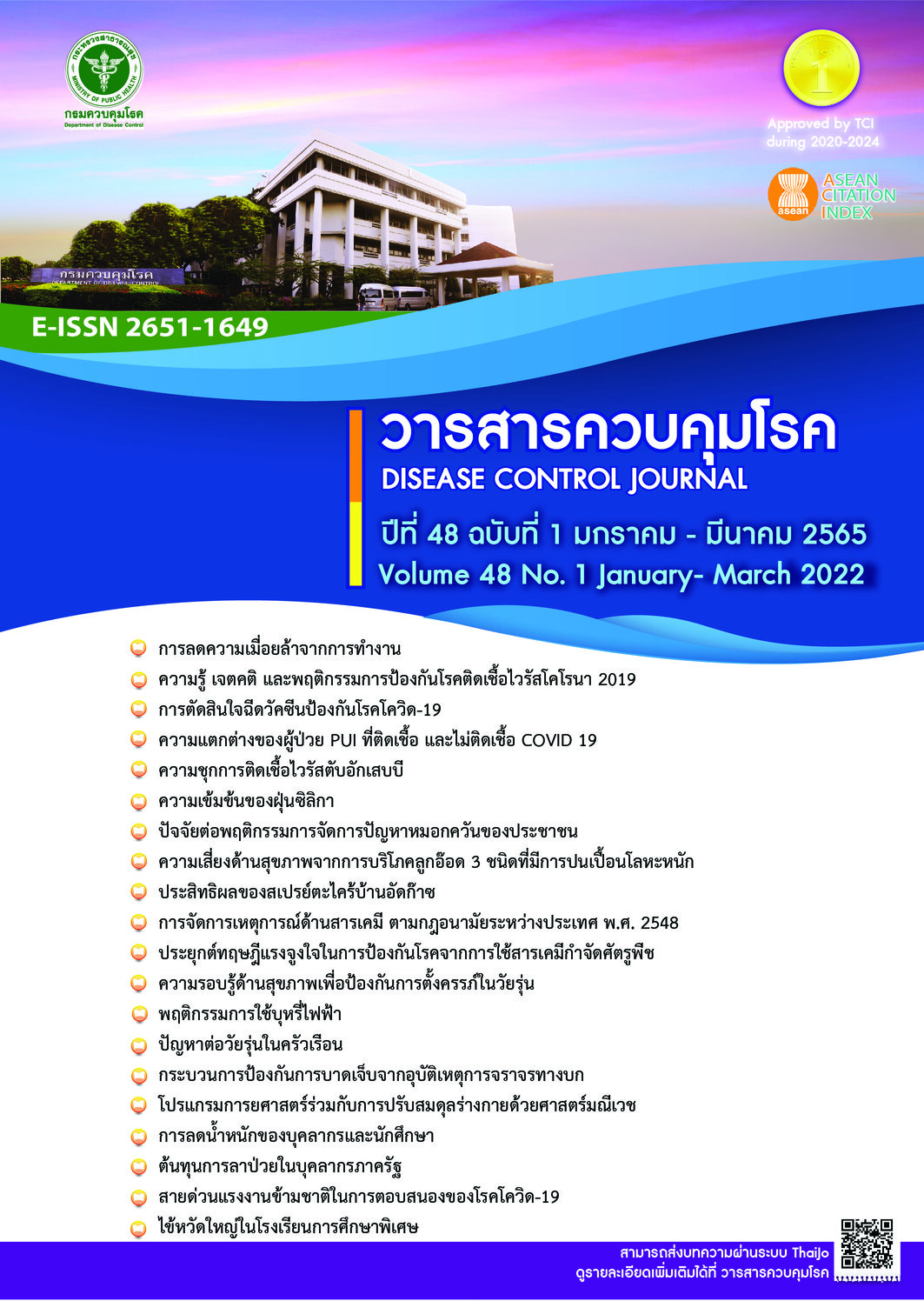Factors associated with the decision to receive COVID-19 vaccination among patients with chronic diseases at Somdejprabuddhalertla Hospital, Samutsongkhram province, Thailand
DOI:
https://doi.org/10.14456/dcj.2022.3Keywords:
during COVID-19 epidemic, COVID-19 vaccine, health belief model, chronic diseaseAbstract
The public health crisis resulting from the SARS-CoV-2 (COVID-19) pandemic has resulted in tremendous morbidity and mortality. Long-term control of the COVID-19 pandemic hinges on the development, distribution, and uptake of vaccines. This study aimed to examine the factors associated with the decision to receive COVID-19 vaccination among patients with chronic diseases at Somdejprabuddhalertla Hospital, Samutsongkhram province, Thailand. A questionnaire based on the Health Belief Model was used to assess multiple factors. Univariate and multivariate analysis were carried out by using the chi-square test and logistic regression analysis, respectively. The study found that 48.33% of patients with underlying medical conditions intended to take COVID-19 vaccination. Factors associated with the decision to take COVID-19 vaccination were more male patients (OR 1.97; 95%CI 1.12-3.48) intending to receive COVID-19 vaccination, those with better education (OR 2.01; 95%CI 1.04-3.85) intending to be administered with COVID-19 vaccine and agreement with the statement “vaccination can prevent COVID-19” (OR 1.32; 95%CI 1.05-1.84), which represents a statistically significant difference (p<0.05). The most dominant communication channels through which the patients had received COVID-19-related information were TV news (56%) and online news (18.33%). This study showed that patients’ knowledge about COVID-19 (in terms of disease knowledge and vaccine efficacy, safety, and adverse events) could raise awareness about the prevention of and vaccination against COVID-19 in patients with chronic diseases. In addition, doctors and healthcare personnel should also give correct and reliable information to the patients
Downloads
References
1. World Health Organization. Coronavirus disease (COVID-19) dashboard [internet]. 2020 [cited 2021 Feb 22]. Available from: https://covid19.who.int.
2. Departmment of disease control.Coronavirus2019 infection (COVID-19) [internet]. 2563 [cited 2021 feb 22 ].Available from: https://ddc.moph.go.th/viralpneumonia/.
3. World Health Organization. Draft landscape of COVID-19 vaccine candidates [internet]. 2020 [cited 2021 Feb 22]. Available from: https://www.who.int/publications/m/item/draft-landscapeof-covid-19-candidate-vaccines
4. Polack FP, Thomas SJ, Kitchin N, Absalon J, Gurtman A, Lockhart S, et al. Safety and Efficacy of the BNT162b2 mRNA Covid-19 Vaccine. N Engl J Med 2020;383:2603-15.
5. Baden LR, El Sahly HM, Essink B, Kotloff K, Frey S, Novak R, et al. Efficacy and Safety of the mRNA-1273 SARS-CoV-2 Vaccine. N Engl J Med 2021;384:403-16.
6. Voysey M, Clemens SAC, Madhi SA, Weckx LY, Folegatti PM, Aley PK, et al. Safety and efficacy of the ChAdOx1 nCoV-19 vaccine (AZD1222) against SARS-CoV-2: an interim analysis of four randomised controlled trials in Brazil, South Africa, and the UK. Lancet 2021;397:99-111.
7. Novavax. Novavax COVID-19 Vaccine Demonstrates 89.3% Efficacy in UK Phase 3 Trial. [Internet]. 2021 [cited 2021 Feb 22]. Available from: https://ir.novavax.com/news-releases/newsrelease-details/novavax-covid-19-vaccine-demonstrates-893-efficacy-uk-phase-3.
8. NDTV. "China's Sinopharm says its coronavirus vaccine is 79% effective" [internet]. 2020 [cited 2021 Feb 22]. Available from: https://www.ndtv.com/world-news/chinas-sinopharm-says-itscoronavirus-vaccine-is-79-effective-2345417.
9. Hsieh FY. Sample size formulae for intervention studies with the cluster as unit of randomization. Statistics in Medicine. 1988; 7(11): 1195-1201
10.Backer MH. The Health Belief Model and personal health behavior. Health Education Monographs. 1974; 2: 324-508.
11.Wicker S, Rabenau HF, et al."Influenza vaccination compliance among health care workers in a German university hospital." Infection 2009;37(3):197-202.
12.Douville LE, Myers A, et al."Health care worker knowledge, attitudes, and beliefs regarding mandatory influenza vaccination." Arch Pediatr Adolesc Med 2010;164(1):33
Downloads
Published
How to Cite
Issue
Section
License
Copyright (c) 2022 Disease Control Journal

This work is licensed under a Creative Commons Attribution-NonCommercial-NoDerivatives 4.0 International License.
Articles published in the Disease Control Journal are considered as academic work, research or analysis of the personal opinion of the authors, not the opinion of the Thailand Department of Disease Control or editorial team. The authors must be responsible for their articles.






